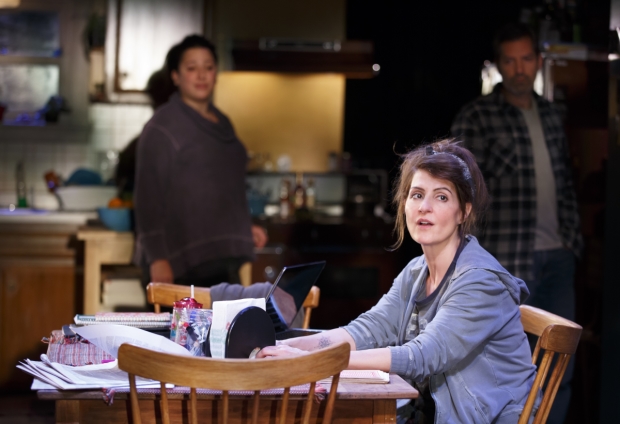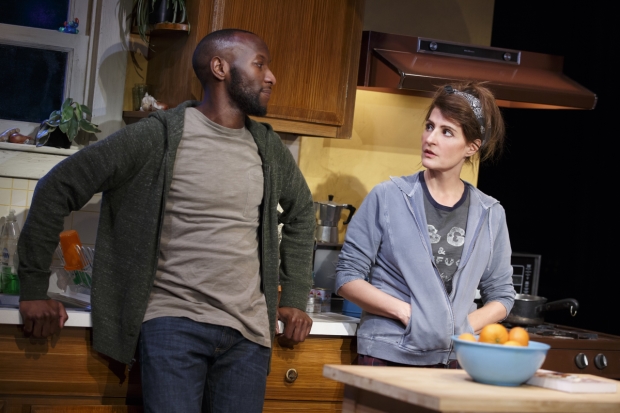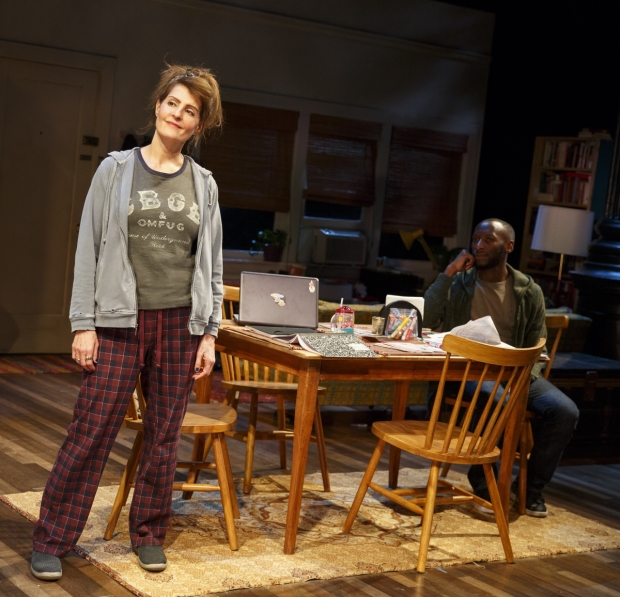
(© Joan Marcus)
Entering the Shiva Theater at the Public is like walking into a home overflowing with life and love. Evidence of children (tiny raincoats, half-eaten plates of cereal) dots the cozy kitchen-cum-living room, where nothing looks too expensive to survive a juice stain or muddy handprint. Rachel Hauck is the designer of this evocative natural habitat for Sugar, the pen name of the online advice columnist at the center of Tiny Beautiful Things, an emotional (and slightly sappy) new play that compellingly theatricalizes the act of giving and receiving advice. Even though no children appear over the following 80 minutes, the space still feels apt because, let's be honest: It's not just kids that make messy mistakes.
The show is based on the self-help book by Cheryl Strayed, who compiled the best of her online advice column, "Dear Sugar." Writer and actress Nia Vardalos (My Big Fat Greek Wedding) has adapted Tiny Beautiful Things in a manner that visualizes the act of seeking advice while breaking down the anonymity of the internet. Sugar (Vardalos) moves around her house completing little chores while three actors (Phillip James Brannon, Alfredo Narciso, and Natalie Woolams-Torres) play the hundreds of people writing in. She offers advice as if she were speaking with an intimate group of friends rather than online strangers, which helps capture Sugar's ultrapersonal tone: Almost every response is steeped in lived experience, some of it very painful.

(© Joan Marcus)
"Several years ago I was in a café with the man who is now my husband," she says to a reader who questions her qualifications to dish out advice. "I was telling him about my divorce, then my months of heroin use which led to the tale of how I'd gotten pregnant by a heroin addict and how I'd felt so angry about having an abortion that I'd intentionally sliced a line in my arm with a knife." While some might think of this as an overshare, Sugar calls it "radical sincerity," barrier-free straight talk from a woman who is qualified to give advice because she has survived a lot.
Unfortunately, as performed by Vardalos, this radical sincerity often comes across as completely false, like the enthusiastic testimony of a religious missionary or high school guidance counselor. We often get the sense that she's fabricating these stories to disarm her readers with a shocking personal anecdote that is eerily applicable to the question at hand.
This may have to do with the source material. While Vardalos uses every opportunity she can to draw out a dialogue between Sugar and her correspondents, the text most often reverts to the form of a letter — something that has been premeditated and therefore lacks the spontaneity of conversation.
Vardalos' costars are more successful at making their letters sound as if they are just rolling off their tongues. Brannon is simultaneously tough and vulnerable when portraying a trans man who has just received a letter from his estranged parents who said some terrible things to him almost a decade ago. Woolams-Torres sensitively plays a woman still reeling from a miscarriage. Narciso gives an emotional tour de force as a father mourning a dead son.
Director Thomas Kail (Hamilton) stages the show with a natural fluidity that allows the script to pass from letter to letter with minimal downtime. When not seeking advice themselves, the three supporting actors play minor characters in Sugar's response stories: a shy girl who covers her face with hair, a lonely boy who steals a camera case, a selfish father with his feet on the coffee table. Every physical choice feels essential, helping us to envision the individuals in the drama.

(© Joan Marcus)
Costume designer Jennifer Moeller outfits the performers in neutral clothing that offers a contemporary American feeling without betraying class or geography. Jeff Croiter lights the expansive set in a way that allows the advice seekers to retreat into the shadows when necessary. They brood and ponder while Sugar moves between her counter and breakfast nook, always ready to take their next question with open arms.
While Sugar's sweeter moments are likely to send some viewers into a diabetic coma, Tiny Beautiful Things captures its subject succinctly and effectively. Even the most jaded audience members will recognize the humanity in this story of reaching out for help and getting it.











